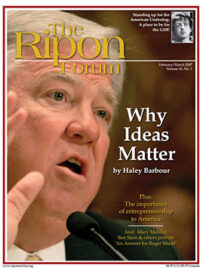Political wisdom suggests that George W. Bush’s presidency will become infected with the lame duck syndrome during his last two years in office.
The scenario goes like this: As soon as Bush missteps on Iraq, immigration or tax policy, the media and the Democrats will gleefully pounce and try to stymie his initiatives. Republican candidates, with an eye toward the 2008 elections, will try to distance themselves from the president’s policies. Career administrators will hunker down and await the arrival of a new chief executive. An irrelevant Bush administration will become an empty shell unable to wield presidential power and shape national policy.
The political pundits who espouse this scenario should take a closer look at history. Contrary to conventional wisdom, the lame duck theory is more myth than reality. The parties in control of Congress, the ability of the president to bargain and persuade as well as the occurrence of exogenous events are far better predictors of presidential success than are term limits.
Since the ratification of the 22nd Amendment in 1951, only three presidents have served two full terms in office. Despite being lame duck presidents, Eisenhower, Reagan and Clinton all saw their support scores in Congress rise in their final year in office. Reagan and Clinton had higher approval ratings in their second term than in their first, and each got a lot accomplished. Even with impeachment, Clinton’s support scores in Congress rose in his last two years in office. A Republican Senate approved more treaties in Clinton’s last two years as president than a Democratic Senate did in his first two years.
In the fall of 2000, The Federalist Society and The Wall Street Journal asked 78 presidential scholars to rank the presidents. Two-term presidents dominated the top ten. Post-22nd Amendment presidents fared well, with Reagan ranked eighth and Eisenhower ninth. Bill Clinton finished 24th, ahead of 14 one-term presidents. Lame duck status seems to have little impact on empirically measurable standards of presidential effectiveness or perceptual evaluations of greatness.

Lame duck presidents have historically not suffered from losses of power as much as they have from abuses of power. Their transgressions are monuments to the arrogance and misuse of power that have pervaded lame duck administrations. Term limits break the chain of accountability and responsiveness that link the presidency to the people. The lack of accountability can lead presidents to resort to extra-constitutional means to achieve their agendas. Alexander Hamilton wrote in Federalist Paper # 72 that without the opportunity for reelection, the president “has no inclination or resolution to act his part well.” The actions of Eisenhower, Nixon, Reagan and Clinton all came under congressional scrutiny during their second terms of office, leading to the impeachment of one president and the resignation of another.
In his last two years in office, lame duck status is the smallest obstacle that George W. Bush needs to overcome. For the first time in his presidency, Bush will have to deal with a Democratic majority in Congress. If the Democratic leadership unleashes the partisan rancor it has harbored since the Republican takeover of Congress in 1994, presidential initiatives may be dead on arrival.
As long as Bush’s approval ratings hover below 40%, he will have difficulty using the “bully pulpit” to gather public support for his foreign and domestic policies.
Contrary to conventional wisdom, the lame duck theory is more myth than reality.
The quagmire that is Iraq continues to erode Bush’s professional reputation as well as his public prestige, and thus weakens his bargaining power in Washington.
With two years left in office, Bush stands at the crossroads of his presidency. Though the prospects for a successful final 24 months in office look dim, there is still a glimmer of light. That Clinton could reinvigorate a beleaguered presidency in 1999 should give hope to Bush in 2007.
To be successful in domestic policy, the president must move toward the center of the political spectrum and embrace bridge rather than wedge issues. He may find common ground with the Democratic Congress on such issues as immigration and education. In domestic politics, Bush maintains powerful weapons such as the veto and executive orders. These instruments should be judiciously employed to further his initiatives while checking those of the opposition.
In the last two years in office, lame duck status is the smallest obstacle that George W. Bush needs to overcome.
In foreign affairs, the president remains constitutionally, if not politically, positioned to accomplish his agenda. After all, despite the results of the 2006 midterm elections, Bush remains the commander-in-chief and the chief diplomat. The Congress has few constitutional powers to challenge the president in the arena of foreign policy and the Democrats have yet to offer a concrete, comprehensive plan to end the war in Iraq. The president must press his constitutional advantages in foreign affairs to craft and implement a policy that will lead to stability in Iraq followed by the withdrawal of American troops.
If the president can establish a bipartisan rapport with the 110th Congress and show progress in stabilizing the situation in Iraq, he may regain the public trust vital to successful governance in a democracy.
In the end, the success or failure of Bush’s last two years in office will hinge largely on events in Iraq, not on his lame duck status. If his recent policy and command changes in Iraq prove to be effective, this lame duck might yet soar. RF
James R. Hedtke is the chairperson of the History and political science department of Cabrini College in Radnor, Pennsylvania and author of Lame Duck Presidents: Myth or Reality (Mellen Press, 2002).




